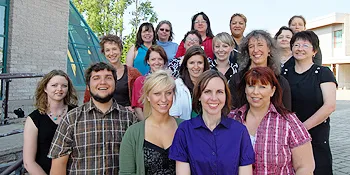Sharing Knowledge. Making a Difference.

Leaving no Child Behind: NationalCollaboration: National Collaborating Centre for Aboriginal Health atUNBC partners with UNICEF CANADA in State of the World’s ChildrenReport supplement
June 24, 2009
Margo Greenwood
Assistant Professor, First Nations Studies
Contact:
250-960-5239
The National Collaborating Centre for Aboriginal Health at UNBC and UNICEF CANADA are issuing a made-in-Canada report on critical health disparities affecting Aboriginal children - the first-ever Canadian supplement to the United Nations agency’s annual State of the World’s Children report. Released in Toronto a week before Canada Day, the joint report diagnoses and proposes remedies for a health care crisis that marginalizes Aboriginal children across the country. The report’s findings:
- On-reserve First Nations child immunization rates are 20% lower than the national rate
- Infant death rate for Inuit children is more than three times the national rate and almost equal to Sri Lanka and Fiji
- The fertility rate of First Nations teenagers is seven times greater than that of other Canadian teenagers
- The TB rate among some Inuit communities between 2002 and 2006 was 90 times higher than that for the non-Aboriginal population
- 40 % of Aboriginal children under age 14 live in crowded homes – more than six times the rate for non-Aboriginal children
The report calls the disparities and gaps in funding and access to health care services one of the most significant children’s rights challenges facing the country.
- Announcement of UNICEF-NCCAH report
- Complete special report
- Backgrounder
UNBC supports unique Canadian centre’s national role in Aboriginal health
Since its establishment at UNBC in 2005, the National Collaborating Centre for Aboriginal Health (NCCAH) has come to be recognized regionally, nationally and internationally for its work supporting Aboriginal communities across Canada in realizing their public health goals. The centre’s partnership with UNICEF CANADA is one of many collaborations linking researchers, policy-makers, communities and health care practitioners. A key goal is to help close the gap between what we know and what we do in the field of Aboriginal public health. Funded by the Public Health Agency of Canada, the NCCAH is one of six centers located across the country, each dedicated to key areas of public health including infectious diseases, environmental health and healthy public policy.
NCCAH Highlights
Working with all sectors: The NCCAH played an historic role in bringing together nearly 50 National Aboriginal Organizations in diverse fields – housing, tourism, sports, culture, justice and more – to find common ground and contribute to better health outcomes for their peoples. In hosting two national gatherings on such a large and inclusive scale, the centre is laying the groundwork for a holistic, coordinated, and comprehensive approach to improved health in Canada.
Released: “Circles of Health: Sharing Our Gifts” – a professionally produced video released nationally and internationally. Visit: www.nccah.ca to view.
Making environmental links: The centre co-hosts at UNBC a virtual network linking researchers and First Nations across Canada in the exchange of knowledge on environmental health. The First Nations Environmental Health Innovation network secretariat is also hosted by UNBC’s BC Leadership Chair for Aboriginal Environmental Health.
- Visit: www.fnehin.ca. Fact sheets address safety in traditional foods, indoor air quality and safe drinking water
International Role in Global Health Report: The NCCAH brought international Indigenous participation to a groundbreaking 2008 World Health Organization report addressing global health inequities, and continues to contribute on the international front (for instance, in New York recently on the United Nations Permanent Forum on Indigenous Issues, and on the UN General Comment on Indigenous Children and their Rights).
Media Downloads
High Res Images
Click on a thumbnail to open a high-resolution file.
Radio Files
To play: Click the link.
To save: Right click the link and select "Save link as" (Mozilla Firefox) or "Save target as" (Internet Explorer).




|
|
June 24, 2009 Margo Greenwood Assistant Professor, First Nations Studies 250-960-5239 |
|||||||
|
The National Collaborating Centre for Aboriginal Health at UNBC and UNICEF CANADA are issuing a made-in-Canada report on critical health disparities affecting Aboriginal children - the first-ever Canadian supplement to the United Nations agency’s annual State of the World’s Children report. Released in Toronto a week before Canada Day, the joint report diagnoses and proposes remedies for a health care crisis that marginalizes Aboriginal children across the country. The report’s findings:
The report calls the disparities and gaps in funding and access to health care services one of the most significant children’s rights challenges facing the country.
UNBC supports unique Canadian centre’s national role in Aboriginal health Working with all sectors: The NCCAH played an historic role in bringing together nearly 50 National Aboriginal Organizations in diverse fields – housing, tourism, sports, culture, justice and more – to find common ground and contribute to better health outcomes for their peoples. In hosting two national gatherings on such a large and inclusive scale, the centre is laying the groundwork for a holistic, coordinated, and comprehensive approach to improved health in Canada.
International Role in Global Health Report: The NCCAH brought international Indigenous participation to a groundbreaking 2008 World Health Organization report addressing global health inequities, and continues to contribute on the international front (for instance, in New York recently on the United Nations Permanent Forum on Indigenous Issues, and on the UN General Comment on Indigenous Children and their Rights). |
Media Downloads High Res Images Click on a thumbnail to open a high-resolution file.
Radio Files To play: Click the link.
|
Contact:
Holly Nathan, Communications Officer, Nationals Collaborating Centre for Aboriginal Health - 250.960.5249
Michael Kellett, Communications Officer, UNBC - 250.960.5621